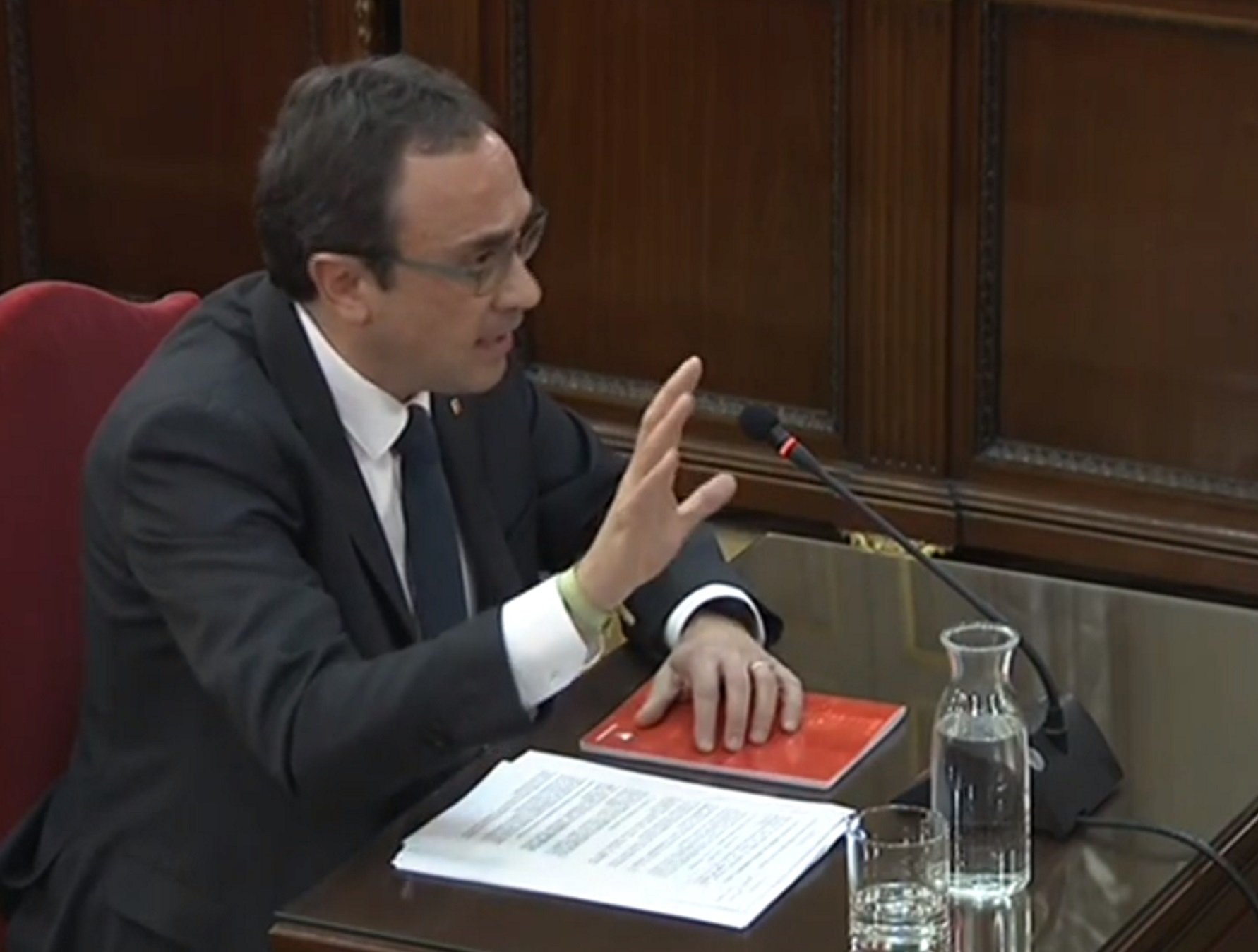The Catalan government went ahead with the unilateral 2017 independence referendum "after having tried, by all means possible, having exhausted the mechanisms the Spanish state gives to hold a referendum", former territory minister Josep Rull told the Catalan independence trial today. He went on to list the paths the government used to try to find a negotiated solution to the calls for independence.
"Firstly, we used the path of article 92 of the Constitution which gives the state the power to call referendums. They went to the Congress to look for consensus and they told us no. The Catalan government's law on referendum consultations was also denied. The law on non-referendum consultations, and they also told us no. We looked for a system for public participation and were told no. We tried it more than 20 times with all the mechanisms we had available," he said.
Rull, like Jordi Turull yesterday, agreed to answer questions from the public prosecutor and the state's solicitor, not just his own defence counsel.
Misuse of public funds
When the prosecutor turned to the charge of misuse of public funds, Rull said that it was not illegal, nor strange that the Catalan government should have made an economic forecast for a referendum, if they are legal. "When I voted for that law, I was protected by parliamentary inviolability and I was unaware I might be committing a crime of disobedience because the Constitution includes a provision for referendums".
"The scenario we anticipated until the last moment was a referendum agreed-upon [with Madrid]," he said.
In response to some of the more specific allegations, he said that "you won't find any invoice with the payment of any type of expense linked to Unipost, because it doesn't exist, because it didn't happen. When spending a euro which comes from everyone's taxes there is an extraordinary level of control and guarantee. A minister cannot decide to spend 500 euros if there's no path," he said.
Rull also noted that Catalonia's accounts had been under even closer control from Madrid since July 2017: "Catalonia's finances are monitored by the state government. A control taken by state decree. With all these checks it's impossible to be able to divert a single euro. I insist: not one public euro was spent on the organisation of the referendum".
The referendum laws
Whilst the prosecutor insisted that the Catalan government had been warned up to six times that what they planned to do was not legal, Rull, explained that nothing was annulled and that he was proud to sign the decree calling the referendum. "It was one of the most important and moving moments I've experienced, to be able to achieve and put at the disposition of the people the tool to express their will. That was an honour for me and an honour for the whole government."
Mobilisations
Mobilisations are "are a fundamental element in all democracies" said Rull, defending the right to protest. That said, when the public prosecutor brought up the topic, Rull was careful to draw a notable distinction. He said the "road map" he signed "made no reference, none" to mobilisations, and suggested the prosecutor was talking about a separate document produced by the Catalan National Assembly which he was not involved with.
The referendum
With public violence needed to defend the charge of rebellion the defendants are facing, Rull only talked about the violence used by the Spanish police during the referendum: "The international observers who experienced the 1st October [2017] were scandalised. Many headlines in the international press the next day had a word in common: 'shame'".
"I never imagined that towards peaceful people, young people, old men, old women, with extraordinary dignity, I would never have thought a level of violence would have been deployed like that which was".
The prosecutor also asked him about voting materials, namely the voting slips and ballot boxes, and whether the minister knew who had ordered them or where they had been produced. Rull said he didn't know those details. The prosecutor brought up an interview he gave to El Nacional (link in Catalan) days before the referendum in which he said he was convinced there would be both ballot papers and boxes. He replied that "I was convinced of it, because it was an extraordinary initiative which involved many people".
The Spanish police boat
A large contingent of the extra officers deployed to Catalonia during and after the referendum were accommodated on a boat which was initially denied permission to dock. When it made the initial request to dock at Palamós, Rull said he "didn't know members of the state's security forces would be staying there".
Expanding, he said that "the government port authority rejected the entry of that boat like it would have rejected the entry of any other. [The boat] didn't use the established mechanisms to request entry into a port. Ordinarily it's managed through a digital platform. You have to make a formal request".
"It didn't use either the ordinary path for vessels of such characteristics, nor did it use the path of a state vessel," said Rull on the prolonged docking process. As he told it, the vessel was eventually sent to Barcelona where it asked to enter as a hotel-vessel, not a state vessel. So, the port of Barcelona, which belongs to the state, said no. It was that evening that the Spanish government gave the formal request for it to dock as a state vessel.
"I didn't refuse the boat's entry, it was done by those in charge of the port in a responsible way," he ended.

